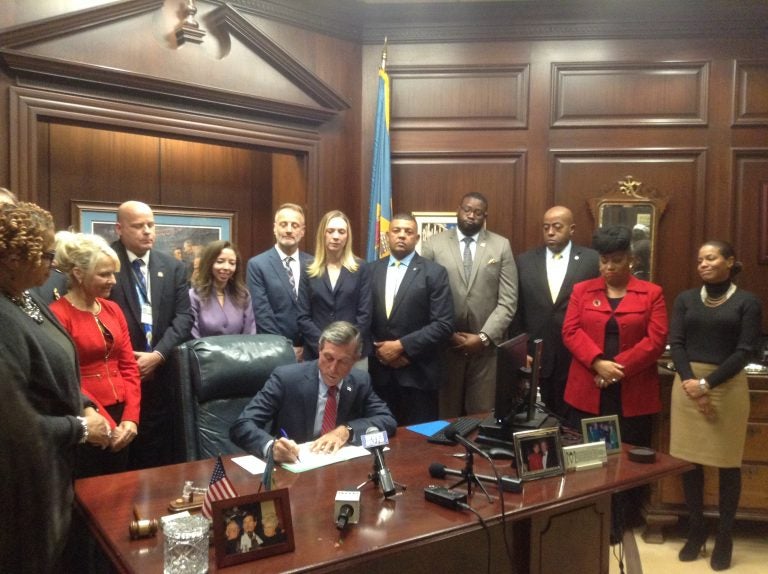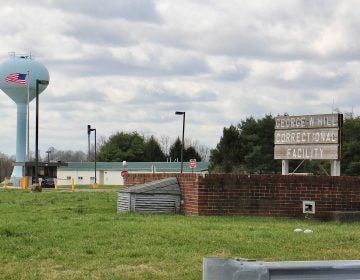Delaware governor announces plan to reduce recidivism
Carney signs order creating commission of legal experts to oversee implementing policies that help inmates more successfully re-enter their communities.
Listen 1:29
Delaware Gov. John Carney signs an executive order Tuesday aimed at reducing recidivism. (Zoe Read/WHYY)
Gov. John Carney signed an executive order Tuesday that aims to reduce recidivism in the Delaware.
The order is a result of Delaware’s participation in the National Criminal Justice Reform Project that helps states launch criminal justice reforms.
The order creates a commission of legal experts to oversee implementing policies that help inmates more successfully re-enter their communities through improved service delivery, shared data among agencies and improved access to academic and vocational training.
In Delaware, which spends $35,000 annually on each inmate incarcerated, about 23,000 people are released prison each year — and about 76 percent of them are rearrested within three years.
Carney said the state needs to do better.
“First of all, we need to be successful, and we’re not doing a very good job right now,” he said. “We need to make sure [of doing a good job], for lots of different reasons — public safety, the welfare of the individuals themselves, the safety of their neighborhoods, their children.”
The order requires a success-rate analysis, and the commission must report to the governor by the end of 2019. The commission will dissolve in 2021, unless Carney chooses to extend the order based on results.
Some one-on-one work with inmates has already started, the governor said.
This initiative, which offers individualized services as soon as inmates enter prison, will be more successful than previous reform efforts because it uses evidenced-based practices, he said Tuesday.
“To me this is more of a — not a commission just overseeing things — but a working group approach to it,” Carney said. “You’re implementing programs, you’re implementing the development of a transition-accountability plan for every level 4 and level 5 inmate, and addressing those individual needs — whether it’s education, behavioral health, skills training.
“The hardest part is when they return to the community and have to deal with life with their children, their families and trying to find jobs — and that’s our challenge, and it’s a big one.”
It’s not the first time the state has attempted to reduce recidivism. Under former Gov. Jack Markell’s administration, various state agencies collaborated in the I-ADAPT program to work with inmates as they left prison to improve access to job training, education, social services and housing.
Department of Correction Commissioner Perry Phelps said the program focused on inmates who were leaving prison within six months — which he said wasn’t enough preparation time.
The biggest gap when providing services to inmates in Delaware’s prisons was cognitive therapy, and that’s an area the new initiative will focus on, Phelps said.
The department will hire additional counselors, as well as some new staff at the bureau level, to achieve that, he said. DOC has struggled to meet staffing needs, however, Phelps calls the goal to increase staff a “marathon, not a sprint.”
The initiative involves an assessment of an inmate’s risk for recidivism; personalized programs for those at highest risk of reoffending; cognitive behavioral therapy; and engaging with a network of community support for inmates once they return to the community. DOC also is working with various organizations in the state that train inmates in fields with good job prospects.
“In the past, across the country, what drives re-entry is, ‘Re-entry is a program, if people just get a program, they will somehow return to society and not reoffend,’” said Jim Elder, chief of community corrections for DOC.
“But re-entry isn’t a program — it’s a process.”
WHYY is your source for fact-based, in-depth journalism and information. As a nonprofit organization, we rely on financial support from readers like you. Please give today.





